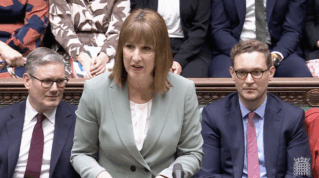The architect of Labour’s proposed apprenticeship reforms, Lord Blunkett, has distanced himself from the party’s pledge to use half of levy funding on other training, saying further “dialogue” is needed to get the flexibility right.
However, the party’s shadow education secretary has confirmed that major levy reform will be a manifesto pledge for the next election.
At September’s party conference following leader Keir Starmer’s keynote address, Labour announced plans to widen the levy so that it could be used more flexibly, saying more details would be published in a report by the former education secretary under Tony Blair, David Blunkett, now the party’s chair of the Council of Skills Advisers.
A press release at the time said the levy would be known as the ‘growth and skills levy’, and explained that “under this, firms will be able to spend up to 50 per cent of their levy contributions, including currently unspent money, on non-apprenticeship training, with at least 50 per cent being reserved for apprenticeships to preserve existing provision”.
Sector leaders raised concern at the time about whether this new system would leave enough funding for small and medium-sized employers to use.
But, in the Council of Skills Advisers’ report – published last week in half term and given to the party leadership to decide what measures they wish to pursue – there was no mention of the 50 per cent split.
When asked by FE Week at last week’s launch event at Lambeth College whether that figure had come from the council’s proposals, Lord Blunkett said: “No, we didn’t recommend that, we recommended that we should reshape it to provide flexibility.”
He added that “there is dialogue to be had with whoever wrote the bit that went out alongside Keir’s speech to get it right, because we have got to get that right”.
Following further questions from FE Week as to whether the 50 per cent split remained a policy commitment, Lord Blunkett later added: “There is complete unity of purpose and alignment on the need to reform the levy, to provide much greater flexibility, and to target both younger learners and those at entry level into apprenticeships.
“The statement put out separately to Keir Starmer’s conference speech was an indicative indication, not a policy commitment. The exact way in which flexibility will be applied will be part of the further policy development.”
Tom Richmond, director of think tank EDSK and a former advisor to government skills ministers, cautioned that politicians who wish to reform the levy “should be wary of arbitrary funding splits that do little to encourage employers to invest more in skills and training”.
He agreed with Lord Blunkett that levy reform offers an opportunity to rethink its purpose, but warned that “extra flexibility for levy-paying employers could easily result in more funding being spent on older and existing employees as well as further rebadging of current training provision as ‘apprenticeships’. This would mean even less funding being available in future for smaller businesses and new recruits, which would be a terrible outcome”.
Labour’s report compiled more than 20 recommendations spanning from early years to adult education, aimed at boosting economic recovery and tackling skills gaps, with the party leadership set to decide what measures it will take forward.
Among some of the other headline recommendations were proposals to bring back the education maintenance allowance (EMA) as well as individual learner accounts, further devolution of decision making and spending powers, and establishing a National Skills Taskforce (NST) bringing together key industry players to drive long-term planning and ensure devolved decisions meet national objectives too.
When asked at the launch event which of the proposals will most likely make it into the party’s next election manifesto, shadow education secretary Bridget Phillipson confirmed the levy reform and NST would be among those.
She said: “I think personally on early years and childcare it is clear we do need a childcare system that supports parents to work but also gives our children a great start in life. We set out the first steps towards that at the party conference around breakfast clubs for every primary school child in England.
“We are also clear that we do need to see apprenticeship levy reform, and Keir spoke about that as well, about the importance of there being great flexibility in making sure that we allow people to upskill and retrain throughout their lives.
“What David’s report says about the National Skills Taskforce we will take forward as Skills England, so bringing together government, business, trade unions, and experts working across government in order to harness that national mission that we need to see around skills.”

















Your thoughts